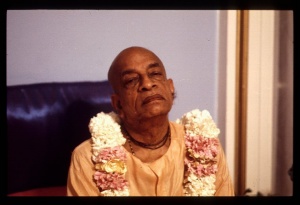SB 12.6.64-65

A.C. Bhaktivedanta Swami Prabhupada
TEXTS 64-65
devarāta-sutaḥ so 'pi
charditvā yajuṣāṁ gaṇam
tato gato 'tha munayo
dadṛśus tān yajur-gaṇān
yajūṁṣi tittirā bhūtvā
tal-lolupatayādaduḥ
taittirīyā iti yajuḥ-
śākhā āsan su-peśalāḥ
SYNONYMS
devarāta-sutaḥ—the son of Devarāta (Yājñavalkya); saḥ—he; api—indeed; charditvā—vomiting; yajuṣām—of the Yajur Veda; gaṇam—the collected mantras; tataḥ—from there; gataḥ—having gone; atha—then; munayaḥ—the sages; dadṛśuḥ—saw; tān—those; yajuḥ-gaṇān—yajur-mantras; yajūṁsi-these yajurs; tittirāḥ-partridges; bhūtvā—becoming; tat—for those mantras; lolupatayā—with greedy desire; ādaduḥ—picked them up; taittirīyāḥ—known as Taittirīya; iti-thus; yajuḥ-śākhāḥ—branches of the Yajur Veda; āsan—came into being; su-peśalāḥ—most beautiful.
TRANSLATION
Yājñavalkya, the son of Devarāta, then vomited the mantras of the Yajur Veda and went away from there. The assembled disciples, looking greedily upon these yajur hymns, assumed the form of partridges and picked them all up. These divisions of the Yajur Veda therefore became known as the most beautiful Taittirīya-saṁhitā, the hymns collected by partridges [tittirāḥ].
PURPORT
According to Śrīla Śrīdhara Svāmī, it is improper for a brāhmaṇa to collect what has been vomited, and so the powerful brāhmaṇa disciples of Vaiśampāyana assumed the form of tittiras, partridges, and collected the valuable mantras.